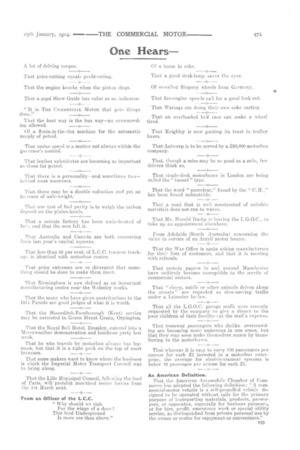One Hears—
Page 3

If you've noticed an error in this article please click here to report it so we can fix it.
A !at of driving torque.
That price-cutting equals profit-eating.
That the engine knocks when the piston rings.
That a good Show Guide has value as an indicator.
" It is ME COMM ERMA L MOTOR that gets things done."
That the best way is the bus way—no overcrowding allowed.
Of a florin-in-the-slot machine for the automatic supply of petrol.
That undue speed is a matter not always within the governor's control.
That leather substitutes are becoming as important as those for petrol.
That there is a. personality—and sometimes two— behind most successes.
That there may be a double reduction and yet an inerease of axle-weight.
That one test of fuel parity is to weigh the carbon deposit on the piston-heads.
That a certain factory has been underlie-also of late, and that the men felt it.
That Australia and Canada are both recovering from last year's capital squeeze.
That less than 65 per cent. of L.C.C. tramear trackage is identical with motorbus routes.
That price extremes are so divergent that something should be done to make them meet.
That Birmingham is now defined as an important manufacturing centre near the Wolseley works.
That the many who have given contributions to the 1014 Parade are good judges of what it is worth.
That the Shoreditch-Farnborough (Kent) service may be extended to Green Street Green, Orpington.
That the Royal sell Hotel • Bromley, entered into a. Merryweather demonstration and luncheon party last week.
That he who travels by motorbus always has legroom, but that it is a tight pack on the top of most tramcars.
That some makers want to know where the business is which the Imperial Motor Transport Council was to bring along.
That the Lille Municipal Council, following the lead of Paris, will prohibit iron-tired motor lorries from the 1st March next.
From an Officer 0 the L.C.C.
" Why should we sigh For the wings of a dove? This bird Underground Is more use than above." Of a boom in coke.
That a good desk-lamp saves the eyes.
Of so-celled Stepney wheels from Garrnany.
That fire-engine .speeds call for a good look-out, That Warings are doing their own coke carting.
That an overloaded baV. race can -make a wheel tired.
That Keighley is now putting its trust in trolley buses.
That Antwerp is to be served by a. £60,000 motorbus company.
That, though a miss may be as good as a mile, few drivers think so.
That single-deck motorbuses in London are being called the " tunnel " type.
That the word " parcelear," found by the "CM.," has been found unbeatable.
That a road that is well constructed of suitable materials does not run to waves.
That Mr. Harold Darby is leaving the I.G,O.C.„ to take up au appointment elsewhere.
From Adelaide (South Australia) concerning the value in service of an Argyll motor hearse.
That the War Office is again asking manufacturers for their lists of customers, and that it is meeting with refusals.
That certain papers in. and around Manchester have suddenly become susceptible to the merits of commercial motors.
That "sheep. cattle or other animals driven along the streets" are regarded as slow-moving traffic under a Leicester by-law.
Th.at all the L.G.O.C. garage staffs were reeently requested by the company to give a dinner to the poor children of their locality--at the staff's expense.
That tramway passengers who dislike overcrowding are becoming more numerous in. one sense' but that they may soon make themselves scarce by transferring to the motorbuses.
That whereas it is easy to carry 150 passengers per annum for each Li invested in a motorbus enterprise, the average for electric-tramcar systems is below d passenges per annum for each ,.C1.
An American Definition.
That the American Automobile Chamber of Commerce has adopted the following definition: "A commercial-motor vehicle is a self-propelled vehicle designed to be operated without rails: for the primary purpose of transporting materials, products, passengers, or apparatus, especially for business purposes, or for hire, profit, emergency work or special utility service, as distinguished from private personal use by the owner or renter for enjoyment-or convenience."






































